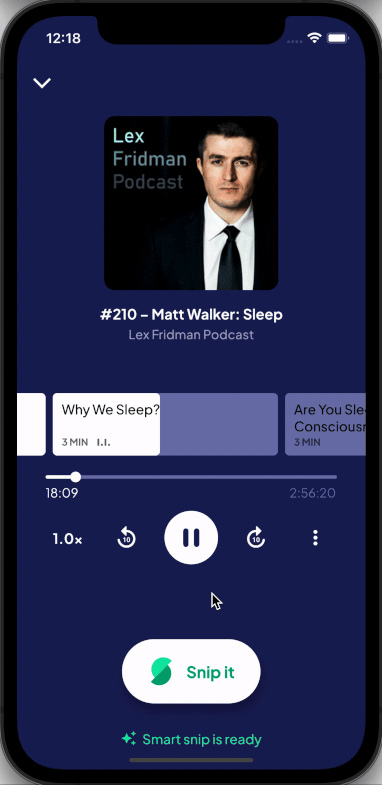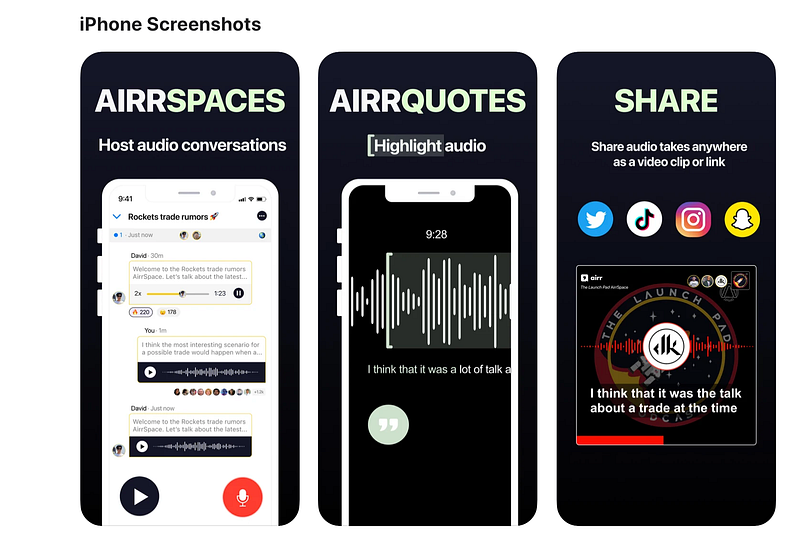Three steps to make the most of your podcast time

Podcasts are an excellent way to acquire new knowledge. Hosts boil hours of research down to digestible content.
Yet, while podcasts are growing into one of the largest knowledge libraries on our planet, many people are not as strategic about their listening practice.
Listening to podcasts doesn’t make you smarter per se — it’s what you pick and do with it that will make all the difference.
The following lines will give you three quick ways to make the most of any value-packed podcast you listen to.
1) Find high quality podcasts
The friction to publishing podcasts is lower than it is for publishing books. You don’t need a publisher. Anyone with a phone and internet connection can become a podcast host.
Hence the quality of podcasts varies, and most podcasts are not worth your time. But some are. Instead of choosing a podcast based on the thumbnail and title, make a short effort to find the best one for you.
You can check out charts in the category “education,” search by keyword and podcast (e.g., best podcasts for language learning), or look at a podcast curation site.
Here are three of my favorite value-packed podcasts for learning:
Huberman Lab
Dr. Andrew Huberman, a tenured professor of neurobiology and ophthalmology at the Stanford University School of Medicine, discusses science and science-based tools for everyday life.
Philosophize This!
Stephen West shares ideas that shaped our world. It’s for anyone interested in an educational podcast about philosophy where you don’t need to be a graduate-level philosopher to understand it.
NPR: It’s an independent, nonprofit media organization founded on a mission to create a more informed public. NPR has many great podcasts, but my favorites are Radio Ambulante (in Spanish) and TED Radio Hour.
2) Use apps that help you remember more
You won’t remember much from a podcast if you only listen to it. Your brain needs repetition and elaboration to make new knowledge stick.
Unlike books, you can’t highlight audio — or can you?
I listen to my podcasts while biking or walking. Hence, an extremely uncomfortable situation to open a notepad or Roam Research whenever I hear an interesting idea.
But two applications have transformed how I listen to podcasts: Snipd and Airr. Both are audio highlighting tools.
When you hear something you want to remember, you tap a button. In Snipd, this creates a snippet that includes a descriptive title with optimized start- and end-points to capture the context, a summary of your snip, and the full transcript.

Airr is very similar to Snipd. The app allows me to tap on my AirPod and pin a conversation so that I can reread it whenever I need it. I no longer need to scan back through an entire episode to find a snippet or thought I can’t quite remember.
I sync Airr with a service called Readwise, which extracts all my audio snippets to Roam and Obsidian.

I haven’t fully tried Snipd yet, but I like Airr (mainly because of the AirPod feature). However, an advantage of Snipd is that it works for Android as well as iOS. Snipd also offers you a direct integration to Obsidian, which makes the monthly Readwise subscription obsolete. You should be able to export markdown with Airr as well, but I haven’t managed to do this.
3) Become a teacher by learning in public
Have you ever read a book only to forget the quintessence three weeks later?
You don’t have a bad memory. Forgetting is natural and actually even essential for learning.
But to make information stick, you’ll want to interrupt this forgetting, ideally, through a meaningful learning practice.
All great books on learning that I have read agree on the effectiveness of teaching newly learned things to others.
In ‘How We Learn’, Benedict Carey writes,
“Many teachers have said that you don’t really know a topic until you have to teach it, until you have to make it clear to someone else.”
The attempt to communicate what you’ve learned to your family, friends or any online audience is a very effective learning technique. Carey again:
“These apparently simple attempts to communicate what you’ve learned, to yourself or others, are not merely a form of self-testing, in the conventional sense, but studying — the high-octane kind, 20 to 30 per cent more powerful than if you continue sitting on your butt, staring at that outline. Better yet, those exercises will dispel the fluency illusion. They’ll expose what you don’t know, where you’re confused, and what you’ve forgotten — and fast.”
Carey is not the only one who recommends teaching what you’ve learned to other people. In ‘A Mind for Numbers’, Dr. Barbara Oakley provides another powerful example:
“The legendary Charles Darwin would do much the same thing. When trying to explain a concept, he imagined someone had just walked into his study. He would put his pen down and try to explain the idea in the simplest terms. That helped him figure out how he would describe the concept in print. Along those lines, the website Reddit.com has a section called ‘Explain Like I’m 5’ where anyone can make a post asking for a simple explanation of a complex topic.”
You don’t have to be an expert on the topic you just listened to on the podcast. Having some knowledge gaps can even benefit your learning practice.
Oakley again:
“You may think you really have to understand something in order to explain it. But observe what happens when you are talking to other people about what you are studying. You’ll be surprised to see how often understanding arises as a consequence of attempts to explain to others and yourself, rather than the explanation arising out of your previous understanding. This is why teachers often say that the first time they ever really understood the material was when they had to teach it.”
So the next time you listen to an episode you want to remember, explain it to your flatmate in a blog post or a short video clip. You will be surprised by how much this practice improves your learning.
My free weekly Learn Letter will give you tools and resources to accelerate your learning. If you’d like to accelerate your online writing, register here.
